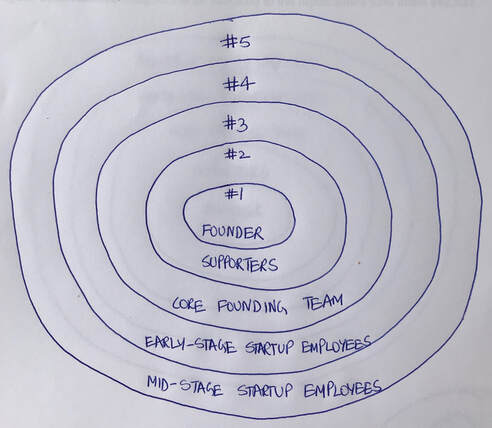Becoming a Founder
Startups make our world better. Startups create better methods to address unmet needs. Startups have a positive impact on our work, home and social life. More people need to become founders to start these startups.
The focus of this note is on individuals who toy with the idea of becoming a founder. An unknown hump keeps them from taking the step forward. It is like going into the forest above.
With a prepared mind, being a founder is very fulfilling. It is a journey that multiplies your abilities. And results in meaningful measurable impact for many more people.
Many Passages to a Founder
There are many myths about what kind of people can't become a founder. Here are some such myths:
Time keeps breaking these myths one by one. And then it becomes an acceptable norm. Founders and investors publish case studies around them.
To your surprise, your background is an asset. You need to figure out how to use it towards your future startup journey. Work on yourself to remove the mental barriers. It will take regular long-term practice.
Start with Vision
Startup journeys are a decade or more. So whatever you choose to go with should inspire you from deep within. No one will motivate you. This is not something to try and see if it works out. It is almost like a marriage, major family relocation or adopting a child. One needs commitment. Most people around you will be either watching or mocking. Passage to your vision could be beyond difficult. Despite all prior planning, unforeseen problems will pop up out of nowhere and at the same time. You will suffer constant defeats. Expect some toll on your personal life. You need to have a genuine excitement about the cause you will pursue as a startup.
Initial vision is super simple. One line. No jargon. It may also sound stupid. Vision could originate from your current or past hobby. An experience in your work or personal or social life. A cause you have a deep concern for. Here are some real-life examples:
I've funded all the above and more. So have other investors along with me. All are growing well with a solid customer base. And there are many more similar startup founders outside of my investments.
Build Your Village
Think of your village as five concentric circles of people. People in each circle are useful for building your startup. Starting from the innermost circle and growing out:
The focus of this note is on individuals who toy with the idea of becoming a founder. An unknown hump keeps them from taking the step forward. It is like going into the forest above.
With a prepared mind, being a founder is very fulfilling. It is a journey that multiplies your abilities. And results in meaningful measurable impact for many more people.
Many Passages to a Founder
There are many myths about what kind of people can't become a founder. Here are some such myths:
- Couples.
- Siblings.
- Salespeople.
- Researchers.
- Non-pedigree education.
- Non-technical background.
- Large company executives.
Time keeps breaking these myths one by one. And then it becomes an acceptable norm. Founders and investors publish case studies around them.
To your surprise, your background is an asset. You need to figure out how to use it towards your future startup journey. Work on yourself to remove the mental barriers. It will take regular long-term practice.
Start with Vision
Startup journeys are a decade or more. So whatever you choose to go with should inspire you from deep within. No one will motivate you. This is not something to try and see if it works out. It is almost like a marriage, major family relocation or adopting a child. One needs commitment. Most people around you will be either watching or mocking. Passage to your vision could be beyond difficult. Despite all prior planning, unforeseen problems will pop up out of nowhere and at the same time. You will suffer constant defeats. Expect some toll on your personal life. You need to have a genuine excitement about the cause you will pursue as a startup.
Initial vision is super simple. One line. No jargon. It may also sound stupid. Vision could originate from your current or past hobby. An experience in your work or personal or social life. A cause you have a deep concern for. Here are some real-life examples:
- Robotic arm for picking items.
- Software for small non-profits.
- Secure mobile voting for everyone.
- Power-efficient chip for phone battery.
- Supersonic plane for commercial travel.
- Marketplace for brands & content creators.
- Engineering automation tool for machine learning engineers.
I've funded all the above and more. So have other investors along with me. All are growing well with a solid customer base. And there are many more similar startup founders outside of my investments.
Build Your Village
Think of your village as five concentric circles of people. People in each circle are useful for building your startup. Starting from the innermost circle and growing out:
- Circle #1: Founder.
- Circle #2: Supporters.
- Circle #3: Core Founding Team.
- Circle #4: Early-Stage Startup Employees.
- Circle #5: Mid-Stage Startup Employees.
Circle #1 is the most important. It's you. With a prepared mind.
Our upbringing and environment has a heavy influence on our thinking and choices. Often this has some hidden deterrents to becoming a founder. Parents wanting you to follow a certain path. Extended family members portrayed as examples. Friends going in a particular direction.
Exposure to the startup world can help broaden your perspective. Couple this with deep thinking about experiences from your upbringing and environment. This will be the foundation of your mind.
Get exposure to the startup ecosystem. Best is to work at an early stage startup. Put in serious hours to learn above and beyond your defined responsibility. Spend disproportionate time with the initial users or customers. Meet more early-stage employees of other startups. Meet some founders. Meet some friendly investors. Ask them what worked, what didn't and why. In essence, absorb like a sponge. Write your rough notes. Your notes will become the starting point of larger things in your startup.
Circle #2 is the one that most founders neglect. They try to build it as they go. A better strategy is to lay it out from the beginning. This circle is two sets of people. The first set is people who will help you for no reason. They like you and want you to succeed. The second set is people who will help you for a reason that benefits both sides. I'll write a separate note on Circle #2.
For Circle #3 to Circle #5, here is a strategy that some founders have used before they started their startup. Start talking to people in your immediate and extended network. Probe what excites them. Have informal conversations to gauge their motivation for a startup. You'll come across folks who want the security of an established company career. And you will come across people who want to join a startup, but your cause doesn't excite them. Keep moving to the next person. You need to assemble a small high-performing team. Almost like special forces missions.
For Circle #2 to Circle #5, the key is to find people who will allow you to focus your energy in the right direction. This is where your judgment should come in. Don't take the offer of help from everyone. It can drain your time and energy.
Prepare before the Journey
Here are some tactical tips. These are a culmination of the experiences of many sets of people. Founders of successful startups. Observations of fellow investors. And my past successful exits and failures before becoming an investor.
I'll cover more aspects around this thread in later notes. Founder-led companies perform well in the long-term. No individual will have more passion for the cause than the founder.
Our upbringing and environment has a heavy influence on our thinking and choices. Often this has some hidden deterrents to becoming a founder. Parents wanting you to follow a certain path. Extended family members portrayed as examples. Friends going in a particular direction.
Exposure to the startup world can help broaden your perspective. Couple this with deep thinking about experiences from your upbringing and environment. This will be the foundation of your mind.
Get exposure to the startup ecosystem. Best is to work at an early stage startup. Put in serious hours to learn above and beyond your defined responsibility. Spend disproportionate time with the initial users or customers. Meet more early-stage employees of other startups. Meet some founders. Meet some friendly investors. Ask them what worked, what didn't and why. In essence, absorb like a sponge. Write your rough notes. Your notes will become the starting point of larger things in your startup.
Circle #2 is the one that most founders neglect. They try to build it as they go. A better strategy is to lay it out from the beginning. This circle is two sets of people. The first set is people who will help you for no reason. They like you and want you to succeed. The second set is people who will help you for a reason that benefits both sides. I'll write a separate note on Circle #2.
For Circle #3 to Circle #5, here is a strategy that some founders have used before they started their startup. Start talking to people in your immediate and extended network. Probe what excites them. Have informal conversations to gauge their motivation for a startup. You'll come across folks who want the security of an established company career. And you will come across people who want to join a startup, but your cause doesn't excite them. Keep moving to the next person. You need to assemble a small high-performing team. Almost like special forces missions.
For Circle #2 to Circle #5, the key is to find people who will allow you to focus your energy in the right direction. This is where your judgment should come in. Don't take the offer of help from everyone. It can drain your time and energy.
Prepare before the Journey
Here are some tactical tips. These are a culmination of the experiences of many sets of people. Founders of successful startups. Observations of fellow investors. And my past successful exits and failures before becoming an investor.
- As a founder, you will always be serving someone. Practice humility and listening. It will make you a lot of money.
- Put your procrastination in a box and bury it. The best time to start something is now. Perfection will come later.
- Practice super-short cycle times for everything. Imagine a window of hours and days and work with it. If you've many ideas for your startup, don't take months to test each one out. Avoid long-drawn market research. Ping people quicker.
- Don't have to quit your day job right away. Use all the hours outside of the job to work on your startup. Cut out every non-essential activity that doesn't help with the startup.
- Warm-up your family and close friends that you are exploring a startup. They are the first set of your Circle #2. Explain what lies ahead. Ask each one for help. Request them for zero nagging.
- Plan your essential pillars: personal finances, key relationships and health routine.
I'll cover more aspects around this thread in later notes. Founder-led companies perform well in the long-term. No individual will have more passion for the cause than the founder.
Let's Talk: If you have a true experience that resonates, please send me an email.
#startup #founders #startupfounders #startupjourney #startupstories #startupsuccess #lessonslearnt #becomingafounder #beingafounder #startingastartup #foundermyths #startupvision #buildavillage #startuppreparation

